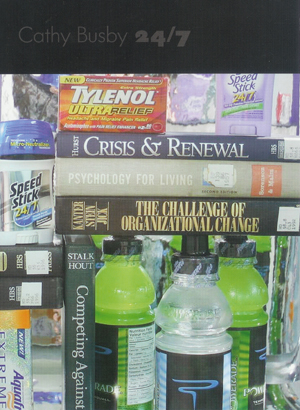 Home Exhibitions MSVU Collection Publications Posters Working Title Resources
Home Exhibitions MSVU Collection Publications Posters Working Title Resources
|
Home » Publications » Catalogue Excerpts » Cathy Busby 24/7 at Work
Cathy Busby 24/7 at Work   Purchase the catalogue Purchase the catalogueGo to the exhibition’s webpage... The Balanced Scorecard Walk into any drugstore and you become marketing’s target. "Empowermint" toothpaste, “High Endurance” body wash, "24/7" deodorant—the packaging language "shops" a set of ideals that the act of buying confirms: I am energized, powerful, effective in the world. The powerful, energetic athleticism advocated by this marketing psychology is but a purchase away. The message implied in such branding language is that social self-regulation requires control of the body, with all its appearances, smells and secretions. Words such as "power," "ultimate" and "extreme" link consumer self-maintenance standards with those of an elite athlete who subjugates the wants and needs of the body to a competitive discipline. Using language to manipulate the consumer is as old as advertising itself and advertising has long been considered an index of a society’s mindset. With 24/7 at Work, Cathy Busby draws parallels between the language used in contemporary marketing and current trends in corporate "manager-speak" as reflected in the msvu Library collection. Flexibility, stamina, and being a "team player" characterize today’s corporate athlete, and this trend is reflected in the language of consumer culture. With this shift, as evidenced by books titled Competing Against Time, The Balanced Scorecard, and Branded Customer Service: the New Competitive Edge, a form of extreme selfhood seems to be emerging as the managerial ideal.
By positioning the consumer in a market similar to that of a professional athlete, branding language blurs the distinction between private and public spheres. The message: what we shave with, brush with, shampoo with, in private, directly affects our public image and reception. Like an athlete’s, our performance is rated like a consumer item. The body–the physical manifestation of self that acts in the world—becomes an object expected to perform, to respond to consumer demand. So when jock talk infiltrates the workplace without question or an ironic smile, is it an indicator of a discourse insidiously infiltrating our lives? When did the office, or the burger joint, or the call centre, become an arena? When we buy into a team mentality, do we become players who can be traded, downsized, commodified, at the owner’s whim? If language is our barometer, work is now a playing field, where we are expected to perform, 24/7, at home and on the job. Stress is the new leisure. Don’t forget your helmet. |